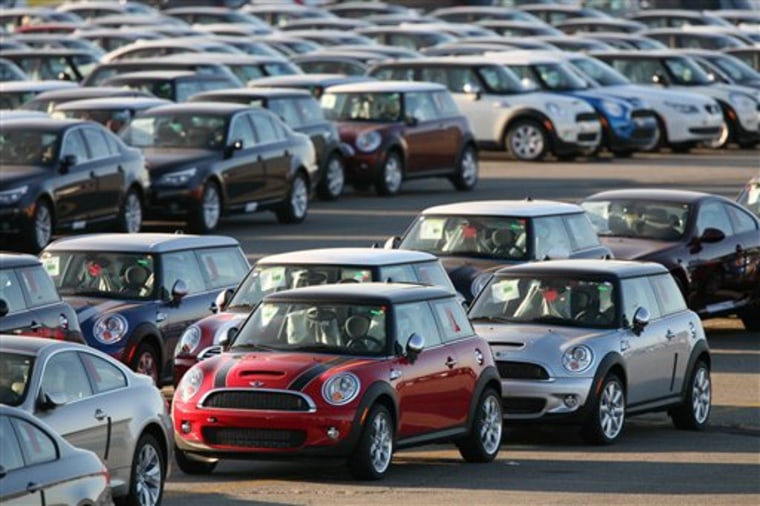For Mini, the maker of sporty — if sometimes eccentric — pint-sized hatchbacks, landing at the bottom of another closely watched vehicle quality study this week is almost a point of pride.
Mini says it deliberately engineers quirks into its cars, like oddly placed dashboard controls or unusual interior lighting, that drag down its ratings in such studies. But Jim McDowell, vice president of Mini's U.S. operations, said those design features are central to the brand's personality.
"Mini has some idiosyncrasies that we engineer into our cars," said Jim McDowell, vice president of Mini's U.S. operations. "We want to make our cars remarkable little cars."
If that sounds like spin, consider that Mini has been among a handful of beneficiaries in the crisis rocking the auto industry. The carmaker owned by Germany's BMW AG has seen sales fall over the last year but has snapped up market share from its bigger rivals. On Monday, it announced plans to open 17 new dealerships across the country, bringing its U.S. total to 100, while Detroit automakers are shuttering locations.
Still, Mini has been dogged by par to sub-par performance in recent quality studies. On Monday, the automaker finished dead last in J.D. Power & Associates' annual initial quality study. The marketing and consulting company ranked 37 nameplates based on car buyers' responses about their first 90 days of ownership. Toyota's Lexus brand placed first.
In the same study last year, Mini was second from the bottom, followed only by Chrysler's Jeep brand, and it came in below average in J.D. Power's study of long-term reliability this year. However, Consumer Reports placed Mini's vehicles slightly above the middle of the pack in its annual reliability survey published in April.
Dave Sargent, J.D. Power's vice president of automotive research, said the firm does not reveal the problems owners reported with individual brands or cars. However, the top five problems reported in the overall study were wind noise, air conditioner or heater control problems, interior scuffing, audio control problems and brake noise.
In other words, the problems that many car owners are reporting these days are relatively minor and often concern oddities that perturb drivers rather than fundamental defects with the performance of the car.
"The term 'low quality' or 'lowest in quality' is like saying the poorest person living in Beverly Hills," said Karl Brauer, editor in chief of the auto Web site Edmunds.com. "I think the differences in the best and worst cars are, in the real-world experiences of most customers, almost imperceptible."
McDowell attributed Mini's poor performance in J.D. Power's most recent study to design quirks like the windshield wiper control. In the Mini, it's a button that presses rather than a knob that turns. Its cars feature adjustable ambient light colors — not an option you're likely to find in your standard Dodge Ram pickup.
Sargent said frustration with unusual parts or features is common when vehicles like the Mini are designed and produced overseas for foreign tastes, then imported to the U.S.
"Some of the things that appeal to European consumers don't necessarily have the same appeal to U.S. consumers," Sargent said.
Still, Mini has fared relatively well in the battered U.S. auto market, which has been crippled by the recession, tighter lending standards and tumbling home values. For the first five months of the year, the brand sold 16,780 vehicles in the U.S., down 21 percent from the same period last year.
But the entire U.S. auto market is down 37 percent during the same period, and Mini has picked up about a tenth of a percent of market share as a result.
Mini remains a niche player. Japan's Toyota Motor Corp., by contrast, sold more than 600,000 vehicles through May this year. Its sales are down about 39 percent for the period.
Mini has set a goal of improving its annual sales by "double-digit" percentages starting in 2011 from its peak in 2008 of 54,077 vehicles sold.
"We think that the United States' society is changing fundamentally, that people are more open to small cars than they were before," McDowell said.
If McDowell is right, Mini is in a good place. It is one of few automakers that have cultivated a reputation for small, fuel-efficient cars that still retain a sporty feel. Minis are not geared toward economy buyers, but the lowest-end Mini Cooper starts at less than $20,000, placing it within reach of many shoppers.
Even if McDowell is wrong about Americans wanting small cars, consumers may not have much of a choice. The Obama administration last month announced new standards that dramatically raise the industry's fuel economy over the next decade. The new standards are likely to be a challenge for the Detroit Three. Not so for Mini, most of whose vehicles already average at least 30 mpg.
At the same time, consumers and industry experts expect the price of gas to continue rising and small cars to continue to supplant trucks and SUVs as consumers' car of choice. Competitors like General Motors Corp. and Chrysler Group LLC — known more for their hulking SUVs than nimble fuel-sippers — have plans to launch new small cars in the coming years.
"It's interesting to me that the car of the future may be a lot like the Mini Cooper Clubman today," McDowell said, referring to the roomiest version of the car.
